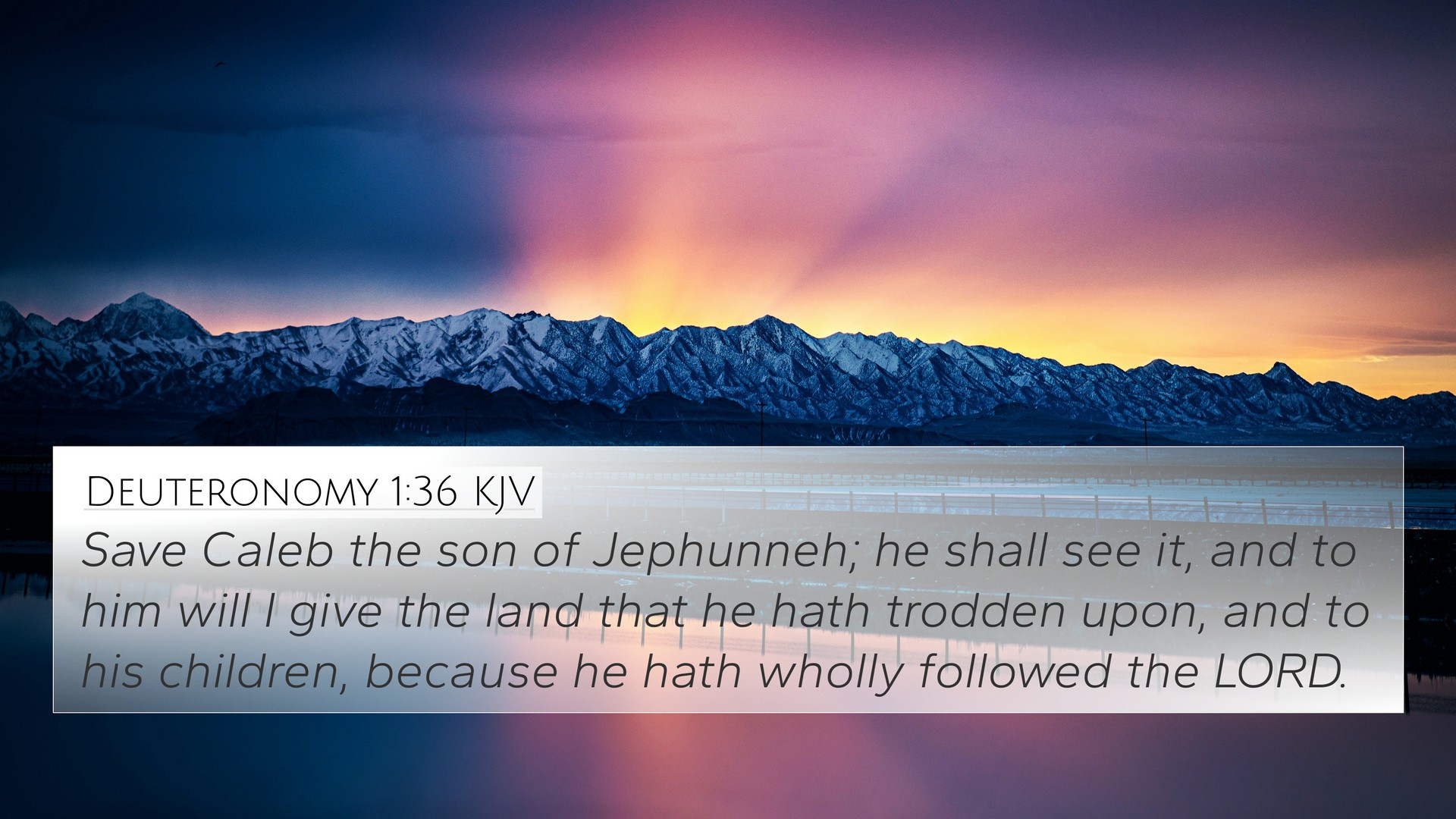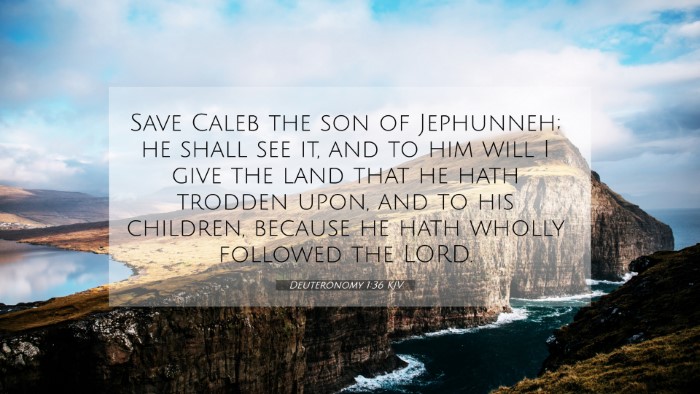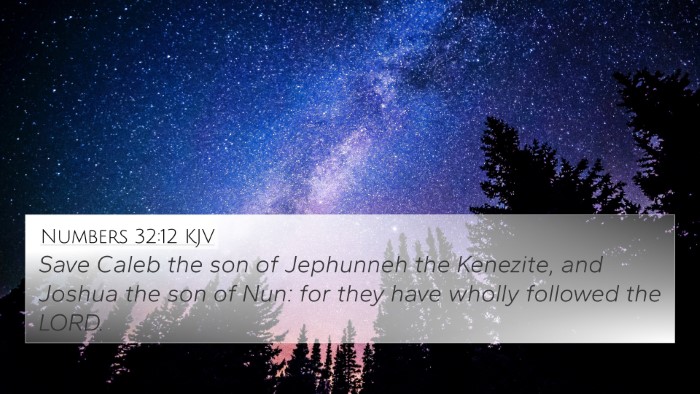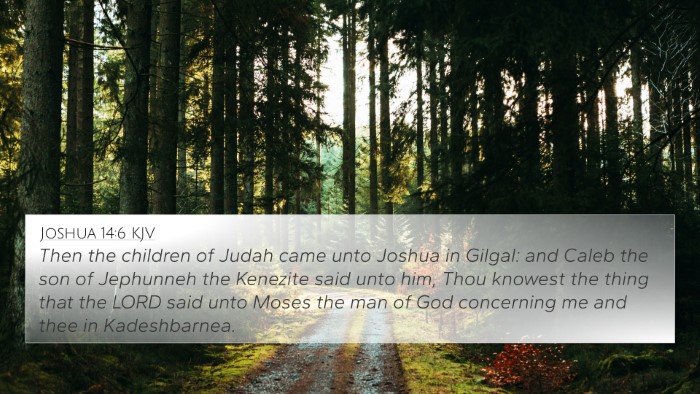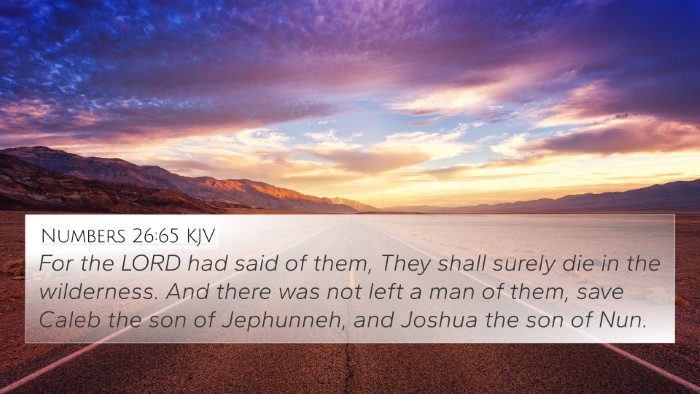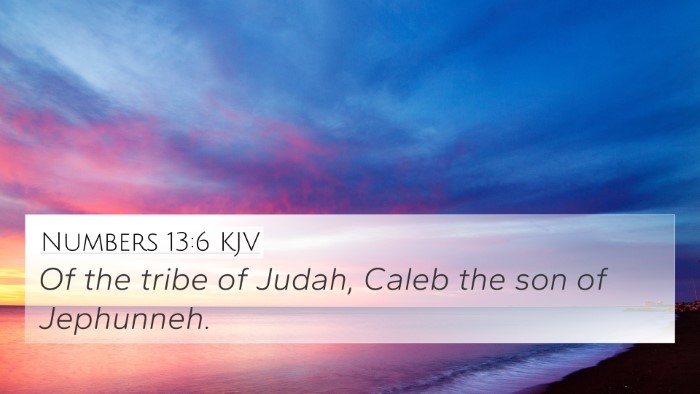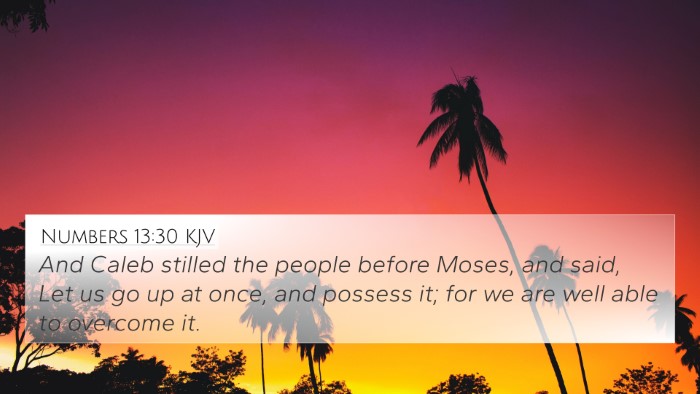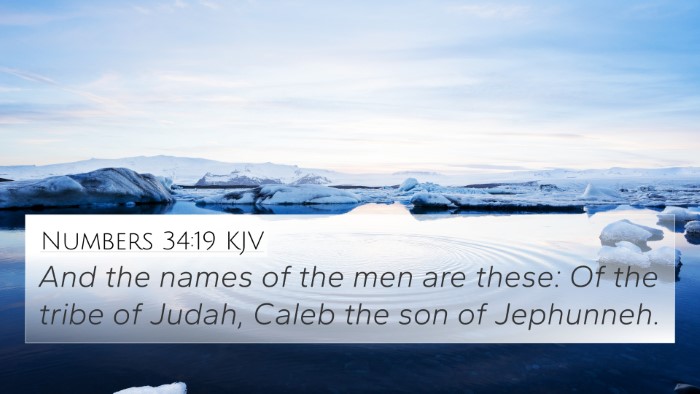Deuteronomy 1:36 - Summary and Interpretation
Bible Verse: "Except Caleb the son of Jephunneh; he shall see it, and to him will I give the land that he hath trodden upon, and to his children, because he hath wholly followed the LORD." (Deuteronomy 1:36)
Understanding the Verse
This verse highlights God's promise to Caleb, reinforcing themes of faithfulness and divine reward. Caleb, one of the twelve spies sent to explore the Promised Land, is distinguished due to his unwavering faith in God. While the other spies discouraged the Israelites, Caleb encouraged them to trust in God's promise.
Commentary Insights
Matthew Henry's Commentary
Matthew Henry emphasizes the mercy shown to Caleb. He notes that Caleb’s faith stood in stark contrast to the fear exhibited by the other spies. Henry points out that God's favor is often not determined by the crowd but by individual faithfulness. Caleb, as a reward for his trust, is promised land and legacy.
Albert Barnes' Commentary
Albert Barnes explains that this verse exemplifies God's justice and temporal rewards. He highlights that the land promised to Caleb not only symbolizes tangible blessing but also reflects God's approval of Caleb's perseverance. Barnes underscores that God's fidelity to His followers will be evident in their blessings.
Adam Clarke's Commentary
Adam Clarke provides additional insights about the consequences of disobedience perceived in the context of Caleb’s reward. Clarke elaborates on the importance of following God wholeheartedly, suggesting that Caleb’s inheritance serves as a vital lesson on loyalty and faith. Clarke reiterates that Caleb's unwavering spirit earned him a significant legacy.
Cross-References
This verse connects with several others that highlight similar themes of faithfulness, divine favor, and inheritance. Below are some notable cross-references:
- Numbers 14:24: God promises Caleb an inheritance because he has a different spirit and follows Him wholly.
- Joshua 14:9: Caleb recalls God's promise regarding the land and his unwavering faith throughout the years.
- Hebrews 3:19: Explores the unbelief of the Israelites that hindered their entry into the Promised Land, contrasting with Caleb's faith.
- Psalm 37:11: Promises that the meek shall inherit the earth, paralleling Caleb's reward for his faithfulness.
- Matthew 25:21: The parable of the talents illustrates the reward for faithfulness, similar to God's reward for Caleb.
- Revelation 2:10: Encourages faithfulness even unto death, with the promise of the crown of life.
- Romans 4:3: Discusses Abraham's faith being credited as righteousness, linking to the theme of faith and divinely granted inheritance.
- 1 Corinthians 9:24: Uses the metaphor of running a race for the prize, analogous to Caleb's diligent pursuit of God's promise.
- James 1:12: States that those who persevere under trial will receive the crown of life, echoing the rewards for faithful followers.
- Galatians 6:9: Encouragement not to grow weary in doing good, for in due season we will reap if we do not lose heart, just like Caleb did.
Thematic Connections
Deuteronomy 1:36 touches on numerous interconnected themes across Scripture:
- Faith and Trust in God: Caleb's unwavering faith serves as a model for believers in trusting God's promises.
- Reward for Faithfulness: Highlights the biblical principle that faithfulness brings divine rewards.
- Legacy and Inheritance: The promise of land to Caleb resonates with the broader biblical theme of inheritance for the faithful.
- God's Sovereignty and Justice: Demonstrates how God's decisions are rooted in justice and righteousness.
- Encouragement in Adversity: Caleb's story inspires believers to remain steadfast despite challenges.
Conclusion
Deuteronomy 1:36 is rich with meaning and serves as a profound reminder of God's faithfulness to those who trust Him wholly. Through the insights from various commentaries and its connections to other scriptures, the verse emphasizes the importance of steadfastness in faith, providing a solid framework for understanding biblical themes of inheritance, reward, and righteousness.
Tools for Further Study
For those wishing to deepen their understanding of cross-referencing Bible texts, consider utilizing:
- Bible concordances to find related verses.
- Cross-reference guides to explore thematic connections.
- Online tools and apps for interactive Bible study.
- Study Bibles that provide insights into parallel verses and their relationships.
Encouragement for Further Exploration
As you delve into the Scriptures, continually seek to establish connections between verses. This practice not only enriches one's understanding but also deepens faith through the realization of God's coherent message throughout the Bible.
